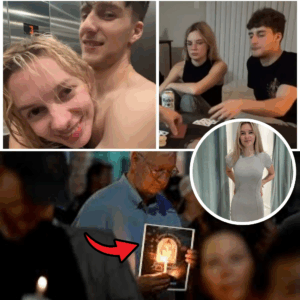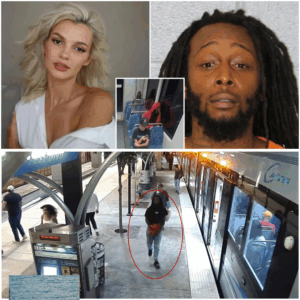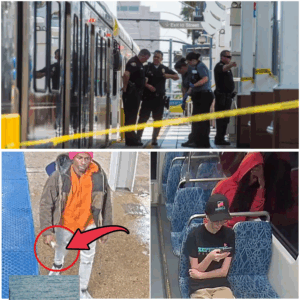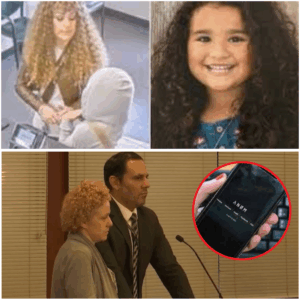In the quiet aftermath of a devastating loss, Alex Rivera, the boyfriend of Ukrainian refugee Iryna Zarutska, has shared a poignant detail about their final plans: a simple, intimate dinner at their Huntersville apartment, just the two of them, after her shift at Zepeddies Pizzeria. The 23-year-old, known for her radiant smile and dreams of becoming a veterinary assistant, never made it home on August 22, 2025, her life abruptly ended by a violent act on a Charlotte light rail train. This revelation, disclosed by Rivera in a heartfelt statement to local media, underscores the ordinary beauty of their life together and the profound void left by a senseless tragedy.

Zarutska, who fled Kyiv with her family in 2022 amid Ukraine’s ongoing conflict, had built a hopeful new chapter in North Carolina. She juggled English classes at Rowan-Cabarrus Community College, a job as a line cook, and her passion for art, crafting colorful clothing designs and sketching animals she hoped one day to care for professionally. Her relationship with Rivera, a 25-year-old software engineer, was a cornerstone of her American journey. The couple, who met at a community fundraiser in late 2024, bonded over shared dreams of a stable future—hers in veterinary medicine, his in tech entrepreneurship. “We were just starting to plan a real life together,” Rivera told WCNC through tears. “That night, it was going to be nothing fancy—tacos, her favorite, and maybe some music. Just us.”
Their evening was meticulously planned. Zarutska texted Rivera at 8:47 p.m., minutes before boarding the Lynx Blue Line at Scaleybark station, confirming she’d grabbed ingredients for their meal: fresh cilantro, limes, and a pack of tortillas from a nearby market. “She was so excited about perfecting her mom’s salsa recipe,” Rivera recalled, his voice breaking. A screenshot of their chat, later shared with investigators, showed her last message: “Home soon, love you. Tacos gonna be 🔥.” The simplicity of the exchange belies the horror that followed.
At approximately 9:49 p.m., as the train pulled into East/West Boulevard station in Charlotte’s bustling South End, 34-year-old Decarlos Brown Jr. allegedly attacked Zarutska with a pocketknife, striking her repeatedly in a sudden, unprovoked assault. Surveillance footage, reviewed by the Charlotte-Mecklenburg Police Department (CMPD), captured the chaos: passengers scrambling, Zarutska collapsing, and Brown fleeing into the night. A bystander’s 911 call at 9:52 p.m. prompted the train operator to halt the car, but despite rapid response from paramedics, Zarutska could not be saved. Brown, a repeat offender with a history of armed robbery and mental health challenges, was arrested hours later and now faces federal murder charges, with prosecutors signaling intent to seek the death penalty.
Rivera, waiting at home with a playlist queued and a table set for two, sensed something was wrong when Zarutska didn’t respond to his follow-up texts. “I kept checking my phone, thinking maybe she missed the train,” he said. By 10:30 p.m., a CMPD officer knocked on his door, delivering the crushing news. The groceries she carried—still clutched in a reusable tote—were recovered at the scene, a stark reminder of the evening that never was.
The revelation of their modest dinner plan has resonated deeply, humanizing a story already heavy with grief. Zarutska’s family, still reeling from the discovery of her pregnancy—kept secret by Rivera out of concern for their fragile circumstances—finds the image of her planning a quiet meal both comforting and agonizing. Her mother, Olena, shared through a translator: “Iryna loved cooking for those she cared about. To know she was coming home to make something special… it’s like losing her all over again.” The family, unable to reunite fully due to her father’s conscription in Ukraine, has leaned on community support, with a GoFundMe raising over $350,000 for counseling and education funds.
Charlotte’s response has been swift and vocal. Mayor Vi Lyles, addressing the tragedy at a September 24 town hall, called the loss “a wound to our city’s soul,” announcing enhanced security measures on the Lynx Blue Line, including doubled patrols and real-time camera feeds. U.S. Transportation Secretary Sean Duffy, overseeing a federal review of transit safety, allocated $12 million for Charlotte’s system upgrades, citing Zarutska’s case as a catalyst. Advocacy groups, from the Ukrainian Community Center to transit safety coalitions, have organized vigils, with one planned for September 26 at Freedom Park, where attendees will share tacos in her honor—a nod to her final, unfulfilled plan.
Rivera, grappling with guilt over his earlier silence about the pregnancy, has vowed to honor Zarutska’s memory. “She was my home, our little routines were everything,” he said. He’s channeling donations into a foundation for refugee women pursuing veterinary studies, reflecting her love for animals. Social media reflects the public’s heartbreak, with #TacosForIryna trending alongside calls for justice. Posts on X highlight her warmth, one user writing: “She planned tacos with love, and a monster stole that. We owe her safer streets.”
The investigation into Brown’s motives continues, with the FBI probing whether he targeted vulnerable commuters. Preliminary findings suggest no personal connection to Zarutska, painting the attack as a random act of violence exacerbated by systemic gaps in mental health intervention and transit oversight. Brown’s arraignment, set for mid-October, is expected to draw national attention, with Attorney General Pamela Bondi framing it as a test case for stricter urban crime policies.
Zarutska’s story, marked by small dreams—a quiet dinner, a future family, a career healing animals—cuts through the noise of policy debates and legal proceedings. Her unsent message about tacos, found alongside her pregnancy tests, paints a portrait of a woman who found joy in the everyday, even after surviving war’s chaos. For Rivera, the empty chair at their table is a daily reminder: “We were supposed to grow old over bad salsa and good laughs. Now, I’ll carry her heart for both of us.”
As Charlotte mourns, the community holds tight to her memory, transforming a simple dinner plan into a symbol of resilience and love interrupted. The Ukrainian Community Center urges donations to Zarutska’s foundation, while CMPD encourages tips via their anonymous hotline. For those touched by her story, the call is clear: honor her light by building a safer, kinder city.



